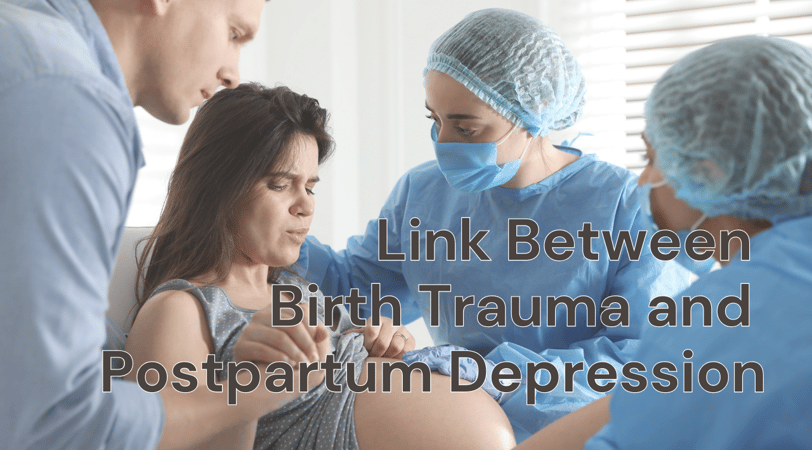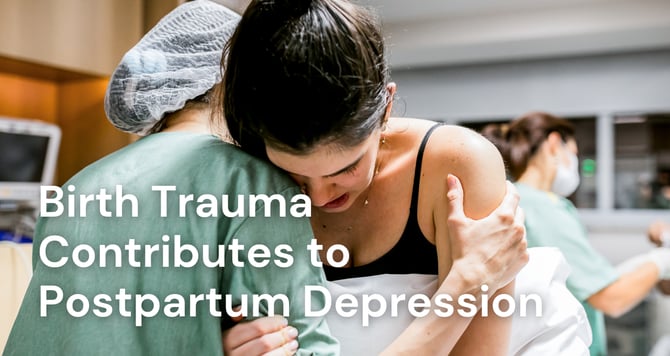The Link Between Birth Trauma and Postpartum Depression
7/1/20254 min read


Childbirth is often described in glowing terms—miraculous, empowering, beautiful. But for many women, it’s something else entirely: traumatizing. When labour and delivery take an unexpected, painful, or terrifying turn, the impact can linger well beyond the hospital stay. This kind of experience is known as birth trauma, and its psychological aftershocks can deeply affect a new mother’s mental health—sometimes triggering or intensifying postpartum depression (PPD).
Although society tends to celebrate the outcome—“a healthy baby”—it often neglects the mother’s emotional and psychological well-being. Yet research is increasingly clear: traumatic births are a significant risk factor for postpartum depression, anxiety, and even PTSD.
At Peace Temple, many of the mothers we support are not just struggling with the day-to-day demands of a newborn—they're also trying to process what happened in the delivery room. Understanding the connection between birth trauma and postpartum depression is essential for healing, empathy, and proper care.
What Is Birth Trauma?
Birth trauma doesn’t have a fixed definition because it’s rooted in subjective experience. What may be manageable or routine for one person can feel traumatic for another.
That said, birth trauma generally refers to:
A birth experience perceived as frightening, violent, or violating
A sense of loss of control or power
Unexpected interventions (e.g., emergency C-section, forceps, vacuum)
Perceived or actual neglect by medical staff
Fear of death or serious harm to self or baby
In some cases, trauma also stems from physical injuries, such as tearing, Hemorrhage, or complications requiring ICU/NICU care. In others, it's emotional—feeling ignored, dismissed, or disrespected during the birthing process.
At Peace Temple, we validate all forms of birth trauma—whether physical, emotional, or both. The pain is real, even if it isn’t visible.
Understanding Postpartum Depression (PPD)
Postpartum depression is a clinical mood disorder that affects approximately 1 in 7 mothers. It involves more than just the “baby blues.” PPD can emerge within weeks of childbirth—or even months later—and symptoms often persist without treatment.
Common symptoms include:
Persistent sadness or emotional numbness
Fatigue and sleep issues (not just baby-related)
Feelings of worthlessness or guilt
Irritability or hopelessness
Trouble bonding with the baby
Intrusive or frightening thoughts
Loss of interest in things once enjoyed
Now let’s explore how birth trauma lays the groundwork for these symptoms.


How Birth Trauma Contributes to Postpartum Depression
1. Disrupted Expectations
Most women enter labour with hopes, preferences, or birth plans. When the experience deviates sharply from those expectations—especially in painful, frightening, or disempowering ways—it creates a gap between what was imagined and what occurred.
This emotional dissonance can leave mothers feeling shocked, disappointed, or even betrayed.
2. Loss of Control
Trauma often arises when a person feels helpless, powerless, or silenced. During a traumatic birth, medical decisions may be made rapidly, with minimal explanation. Even necessary interventions can feel violating if a mother’s voice isn’t heard or respected.
The lingering feeling of “something happened to me” rather than “I participated in this experience” is a common contributor to postpartum depressive symptoms.
3. Unprocessed Fear or Grief
Birth trauma is rarely processed in real time. Mothers are rushed from delivery into new born care without the space to reflect on what just happened. When grief, fear, or shock are ignored or suppressed, they often re-emerge as irritability, detachment, or depressive symptoms.
At Peace Temple, we offer a safe space to revisit and unpack the birth story—validating the experience without minimizing its impact.
4. Physical Recovery and Emotional Fallout
Injuries, scars, or complications from traumatic births extend the physical recovery timeline. When healing is slow or painful, it can delay bonding, disrupt sleep, and increase stress. The body remembers trauma—and that physical distress can fuel emotional fatigue.
Mothers may feel disconnected from their bodies, ashamed of what happened, or angry that their recovery isn’t as quick or “normal” as expected.
5. Attachment and Bonding Challenges
Mothers who have experienced birth trauma often struggle to connect with their babies—not from a lack of love, but from unresolved fear or resentment tied to the birth experience. This emotional block can lead to guilt, deep sadness, or feelings of failure—all hallmarks of PPD.
When this happens, the message we offer at Peace Temple is clear: it’s not your fault. Bonding is not a switch—it’s a process. And there is support.
Risk Factors That Intensify the Link
While birth trauma increases the likelihood of postpartum depression, the risk is higher if certain factors are present:
History of mental health issues (e.g., anxiety, depression, PTSD)
Lack of emotional or partner support
NICU admission or baby health complications
Emergency surgical interventions
Poor communication or disrespect from medical staff
Unresolved trauma from previous births or life events
Recognizing these risks early can help providers and families intervene proactively, offering therapy or support before symptoms worsen.
Healing and Recovery: What Can Help
The emotional aftermath of birth trauma and PPD is intense—but it’s not permanent. With the right care, many mothers not only recover but emerge stronger, more self-aware, and more compassionate toward themselves.
1. Birth Story Processing
Talking through the birth experience with a trained therapist allows mothers to make sense of what happened, separate fact from fear, and find meaning in their story. This can be deeply cathartic, especially when combined with trauma-informed care.
At Peace Temple, we specialize in guided birth story processing that honours both emotional truth and medical context.
2. Trauma-Informed Therapy
Modalities like EMDR, somatic experiencing, and cognitive-behavioural therapy can address trauma held in the body and mind. These approaches are particularly effective for mothers who feel “stuck” in fear, guilt, or flashbacks.
3. Supportive Community
Connecting with others who’ve experienced birth trauma helps reduce isolation and normalize complex feelings. Peer support groups—whether online or in person—can validate emotions and offer hope.
Peace Temple’s support circles bring together mothers with shared experiences in a space of empathy and healing.
4. Gentle Reconnection With the Baby
When bonding feels difficult, we encourage non-pressured moments of closeness: skin-to-skin contact, babywearing, eye contact, lullabies. Reconnection is built over time—brick by brick, not all at once.
Final Thoughts: Your Experience Matters
Birth trauma is real. It’s valid. And it deserves care—not dismissal. When unacknowledged, it can bleed into motherhood, coloring every moment with sadness, guilt, or fear. But when named and supported, that trauma can be transformed into a pathway toward deeper understanding and healing.
At Peace Temple, we believe that no mother should suffer in silence—not from the way her baby entered the world, and not from how that entry made her feel. You are allowed to grieve. You are allowed to be angry. And you are absolutely allowed to heal.
You are not broken. You are in recovery.
